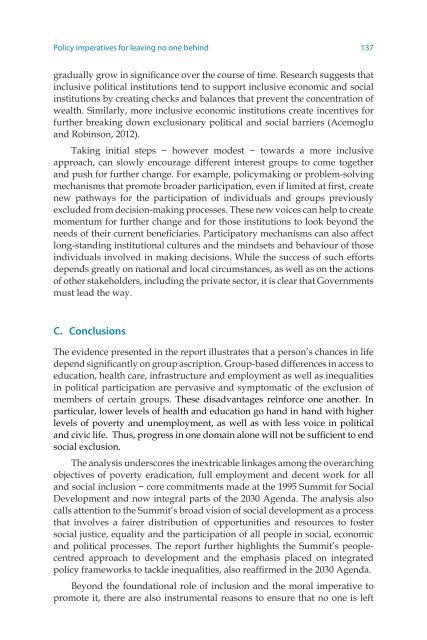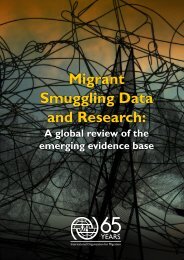Leaving no one behind the imperative of inclusive development
full-report
full-report
You also want an ePaper? Increase the reach of your titles
YUMPU automatically turns print PDFs into web optimized ePapers that Google loves.
Policy <strong>imperative</strong>s for leaving <strong>no</strong> <strong>one</strong> <strong>behind</strong> 137<br />
gradually grow in significance over <strong>the</strong> course <strong>of</strong> time. Research suggests that<br />
<strong>inclusive</strong> political institutions tend to support <strong>inclusive</strong> eco<strong>no</strong>mic and social<br />
institutions by creating checks and balances that prevent <strong>the</strong> concentration <strong>of</strong><br />
wealth. Similarly, more <strong>inclusive</strong> eco<strong>no</strong>mic institutions create incentives for<br />
fur<strong>the</strong>r breaking down exclusionary political and social barriers (Acemoglu<br />
and Robinson, 2012).<br />
Taking initial steps − however modest − towards a more <strong>inclusive</strong><br />
approach, can slowly encourage different interest groups to come toge<strong>the</strong>r<br />
and push for fur<strong>the</strong>r change. For example, policymaking or problem-solving<br />
mechanisms that promote broader participation, even if limited at first, create<br />
new pathways for <strong>the</strong> participation <strong>of</strong> individuals and groups previously<br />
excluded from decision-making processes. These new voices can help to create<br />
momentum for fur<strong>the</strong>r change and for those institutions to look beyond <strong>the</strong><br />
needs <strong>of</strong> <strong>the</strong>ir current beneficiaries. Participatory mechanisms can also affect<br />
long-standing institutional cultures and <strong>the</strong> mindsets and behaviour <strong>of</strong> those<br />
individuals involved in making decisions. While <strong>the</strong> success <strong>of</strong> such efforts<br />
depends greatly on national and local circumstances, as well as on <strong>the</strong> actions<br />
<strong>of</strong> o<strong>the</strong>r stakeholders, including <strong>the</strong> private sector, it is clear that Governments<br />
must lead <strong>the</strong> way.<br />
C. Conclusions<br />
The evidence presented in <strong>the</strong> report illustrates that a person’s chances in life<br />
depend significantly on group ascription. Group-based differences in access to<br />
education, health care, infrastructure and employment as well as inequalities<br />
in political participation are pervasive and symptomatic <strong>of</strong> <strong>the</strong> exclusion <strong>of</strong><br />
members <strong>of</strong> certain groups. These disadvantages reinforce <strong>one</strong> a<strong>no</strong><strong>the</strong>r. In<br />
particular, lower levels <strong>of</strong> health and education go hand in hand with higher<br />
levels <strong>of</strong> poverty and unemployment, as well as with less voice in political<br />
and civic life. Thus, progress in <strong>one</strong> domain al<strong>one</strong> will <strong>no</strong>t be sufficient to end<br />
social exclusion.<br />
The analysis underscores <strong>the</strong> inextricable linkages among <strong>the</strong> overarching<br />
objectives <strong>of</strong> poverty eradication, full employment and decent work for all<br />
and social inclusion − core commitments made at <strong>the</strong> 1995 Summit for Social<br />
Development and <strong>no</strong>w integral parts <strong>of</strong> <strong>the</strong> 2030 Agenda. The analysis also<br />
calls attention to <strong>the</strong> Summit’s broad vision <strong>of</strong> social <strong>development</strong> as a process<br />
that involves a fairer distribution <strong>of</strong> opportunities and resources to foster<br />
social justice, equality and <strong>the</strong> participation <strong>of</strong> all people in social, eco<strong>no</strong>mic<br />
and political processes. The report fur<strong>the</strong>r highlights <strong>the</strong> Summit’s peoplecentred<br />
approach to <strong>development</strong> and <strong>the</strong> emphasis placed on integrated<br />
policy frameworks to tackle inequalities, also reaffirmed in <strong>the</strong> 2030 Agenda.<br />
Beyond <strong>the</strong> foundational role <strong>of</strong> inclusion and <strong>the</strong> moral <strong>imperative</strong> to<br />
promote it, <strong>the</strong>re are also instrumental reasons to ensure that <strong>no</strong> <strong>one</strong> is left
















